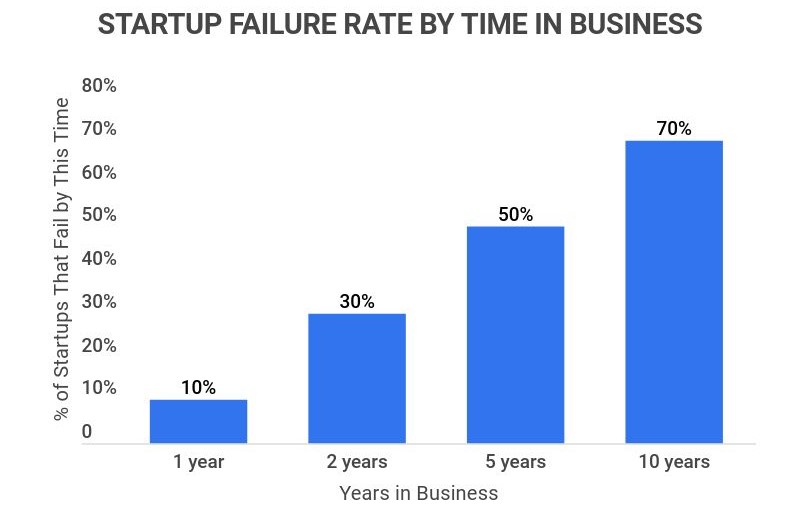Navigating the perilous waters of the startup world can be daunting, with numerous factors at play that dictate whether a new venture will soar to unprecedented heights or sink into the abyss of forgotten ideas. As someone who has seen the startup lifecycle from inception to either success or dissolution, I understand the urgency in grasping the nuances that contribute to a Startup Company Success Rate. Armed with insights and a thorough analysis, let’s unveil the vital strategies that can help your startup not only survive but thrive in today’s cutthroat business environment.
The startup company success rate hinges on meticulous planning, market receptiveness, robust financial backing, and agile adaptability.
Startup Company Success Rate Overview
Defining Success and Failure in the Startup Landscape
Success in the realm of startups often means overcoming the harrowing statistic that up to 90% of new businesses falter, according to Exploding Topics. Thriving beyond the formative phases and delivering positive ROI is the goal, while failure typically manifests as operations grinding to a halt—rooted in financial woes or misjudged product-market fit.
Factors Influencing Success Rate
Understanding what fuels success is just as important as recognizing the causes of failure. The key elements that shape a startup’s trajectory include:
- Market Demand: Essential to product relevance and longevity.
- Financial Management: The hallmark of operational efficacy and investor confidence.
- Team Dynamics: Cohesion and leadership that steer the startup’s vision.
- Marketing and Customer Acquisition: Essential for growth and market penetration.
- Agility: The ability to pivot and evolve with market trends.
Top Startup Failure Statistics
Current Failure Rate
The chilling current landscape, as stated by Embroker, reveals that 90% of startups eventually fail, with a disheartening 10% succumbing in the first year alone.
Year-by-Year Survival Statistics
The attrition rate cuts deeper over time, leaving barely 55% afloat by the five-year mark and a mere 35% grappling to persist beyond a decade.
Reasons Behind Startup Failures
Lack of Market Demand

Source: Zippia
Echoing the importance of market demand, not addressing a substantial or existing need is the foremost reason for startups to falter.
Cash Flow Challenges
The lifeblood of any business, maintaining a positive cash flow, proves elusive for many, causing an operational chokehold that few recover from.
Insufficient Market Research
Skimping on market research often leads startups to misinterpret consumer desires, culminating in products that fail to resonate.
Competition and Market Dynamics
The rapid escalation of industry giants and shifting market landscapes can abruptly diminish a startup’s relevance.
Team and Internal Conflicts
Dis-harmony within the team can deteriorate the core of a startup, derailing even the most promising ventures.
Role of Investors and Funding in Startup Success
The Importance of Securing the Right Investors
Finding investors who share the vision of the startup and offer more than just capital can profoundly impact its trajectory.
Funding Stages and Startup Evolution
Multiple funding rounds are a natural part of a startup’s evolution, each essential to its scaling and development.
Industry and Sector-Specific Failure Rates
Variations Across Industries
Startup vicissitudes greatly vary among sectors, with the pace of innovation and industry-specific hurdles shaping their fate.
Technology Sector Challenges
Tech startups engage in an intense race against time and rivals, with rapid obsolescence threatening their existence.
The Impact of Fintech and Healthcare Innovations
Despite promising opportunities, fintech and healthcare startups often collide with stringent regulations and sluggish customer adoption.
Strategic Advice for Aspiring Entrepreneurs
Focusing on Market Validation
Real-world market validation should be the priority to ascertain actual demand for the product or service offered.
Building a Resilient Team
A varied yet unified team can form a robust backbone capable of weathering the proverbial storms.
Embracing Flexibility and Adaptability
The startups that can innovate and reinvent themselves in the face of changing markets are the ones likely to endure.
Leveraging Lean Startup Methodologies
Lean methodologies encourage efficient idea testing, conserving resources while refining the business model.
Conclusion: The Path to Startup Success
In conclusion, the path to startup success, replete with obstacles and challenges, demands strategic acumen, keen adaptability, and unwavering resolve. By acknowledging the statistical realities and applying the lessons gleaned from those who have navigated this treacherous terrain before, aspiring entrepreneurs can tilt the scales in their favor. Remember, a startup’s lifespan is not preordained; it is the byproduct of calculated decisions, insightful leadership, and the relentless pursuit of innovation. Embrace the journey with the right strategies, and success may well be within grasp.






